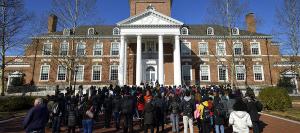Note:
The following article is about a trend that is not universal. There are notable exceptions to the trend described here. This is also not an article about conspiracy. It is about mission creep and a loss of focus which is often invisible to outside observers and the product of more than one factor.
As an undergraduate, light years ago, a major conflict erupted between two of my professors. Each professor recruited students in a battle over the differences between them. Had this been a healthy, classroom debate about the philosophical and, in this case, theological issues at stake, their differences with one another would have made a great contribution to their student’s educations. .
But – as is more and more common – the debate was not about those issues at all. It was much more feral than that, and it impinged upon the future of the institution and its religious commitments. Both were, in fact, at war with one another to shape the future of their workplace and they enlisted their students in that struggle.
As a result, the students were drawn into the politics of the place where they were meant to get an education. They were drawn off-task. They received less education than they might have. Their attention was drawn away from what could have been a substantive academic conversation. And it even became impossible for some of the students to stay, because the faculty members treated some of them like enemy combatants.
That was, as I said, a long time ago. But now such debates (though not universal) are no longer an anomaly or just a feature of religious institutions. Instead, institutions of higher education have fractured into multiple battles of this kind in which faculty are often the recruiters. And, to make matters worse, students are actively recruited to participate not just in battles for the future of the schools that they attend but in larger social, political, and geopolitical debates.
To make the situation worse yet, these roles no longer arise out of a chance debate between faculty members. Students are told in a hundred and one ways that social transformation is their role and a major reason why they are in school. This trend is not just encouraged by some faculty, it is also now a part of the context in which students study. And the distraction from the academic task is magnified by the work of mid-level administrators who are specifically hired to engineer the social fabric of the institution — often with the ambition of shaping the world, as well.
Inevitably, much of what is taught in classrooms is ideological and partisan in nature. The content of classroom discourse can be thin in historical perspective. A discussion of the issues and debates that shaped many disciplines are abandoned; and far more attention is given to the political debates of the moment. As a result, it is becoming increasingly common for schools to craft entire degree programs with a view to continuing the crusade begun in the classroom.
The reasons for this development are disparate and overlapping:
Generations of older Baby Boomers, turned faculty assumed that demonstrations at Kent State and the Democratic Convention of 1968 changed American foreign policy in Vietnam. Passing along this assumption, they used their students to engage in what they believed was their true vocation (or the most important feature of it), and they passed this notion on to successive generations of graduate students.
This became fairly easy to do, as ever greater numbers of faculty participated in this bait and switch. And it was not all difficult, given the utilitarian bent of American education. All one needed to do, was trade out the goal of creating responsible citizens in favor of of creating prophets, social architects, disrupters, resisters, and community organizers.
This has become all the more inevitable as administrators and HR departments have begun requiring candidates for faculty positions to tow this or that line, socially and politically. And because that pressure has moved far beyond the handful of disciplines that might have been construed as the most immediately relevant, it is becoming more and more difficult for students who would just like to study to find refuge anywhere on the modern campus. I am acquainted with more than one degree program that was redesigned specifically to indoctrinate incoming students and flush out students who might not be as socially aware as the institution thought they should be.
What does this mean for institutions of higher education and especially the students who attend them?
One: It means that from the get-go, students who thought they were going to institutions that would both broaden and deepen their knowledge of a subject, are confronted by structures and people who view them as people who need to be deconstructed, made more sophisticated, given superior ideas, and assigned a role in the larger mission of societal and political reform.
Two: It means that they will be exposed to that message – across the curriculum – over and over again. So, a handful of ideological commitments that could be mastered over a weekend will be repackaged, discipline by discipline, and force-fed to them.
Three: This means that they will inevitably learn less of what they need to know, because the more ground those ideological commitments occupy, the less space there is to cover other basics, never mind more complex information. And, sadly, because their teachers are increasingly the product of this enterprise, the truth is, fewer and fewer of them have mastered that material themselves.
Four: This dynamic means that – over time – academic degrees will be more weakly rooted in an historical appreciation of each discipline. The subject matter will be ever more captive to the debates, vocabulary, and issues of the moment. And, as a result, students will graduate without the body of knowledge that would help them to appreciate where their respective disciplines have been and what they are all about.
Five: Ironically, that also means that when and where it is necessary, they will be less and less capable of speaking to contemporary developments, because it is only with historical perspective that you can understand the ever changing, present moment.
The simple, important truth about education is that every student, year after year, degree after degree, decade after decade needs to know the history of the discipline they are studying, the essential information that pertains to that discipline, the current state of inquiry, and something about the growing edge of that enterprise. And an effective institution, as well as its faculty, has that effort as its one and only mission.
So, professors should be engaged in an enterprise that is – at one level – an inherently boring effort. Because, year after year, class after class, with minor adjustments as a body of knowledge grows and changes, every student still needs the same thing. There is limited room for faculty to indulge their research interests. There is limited room to tweak the basic content of what is taught. And there is no room for professors to abandon that effort in favor of recruiting their students in a self-aggrandizing effort to prove that they, more than anyone else, know how to rule the world.
But that perennial effort is only boring, if you have no interest in helping students acquire that body of knowledge, and if you think that watching a student finally “get it” is tedious and unimportant. By contrast, faculty who consider those remarkable moments as the true compensation for an academic life are never bored, always rewarded, and forever grateful for their calling.
Students and their parents should settle for nothing less in the faculty and institutions that they entrust with that journey.













